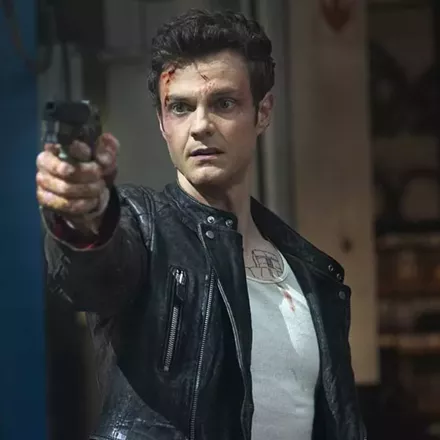The Man from U.N.C.L.E.
The Man from U.N.C.L.E. carves out a unique space in a crowded espionage marketplace
By Scott Renshaw @scottrenshawIt's understandable if your first reaction to a movie version of The Man From U.N.C.L.E. is, "Do we really need another movie version of an old TV show?" This is a reaction one should have on a regular basis, and it only means that you are an emotionally healthy adult. But there's another, equally valid first reaction: "Do we really need another spy movie?"
It's true, of course, that the same sentiment could apply to many genres and subgenres: comic-book movies, Nicholas Sparks adaptations, comic-book movies, childhood-toys-as-cinema, comic-book ... you get the picture. But finding a distinctive tone can go a long way toward shaking that sense of overkill. With a James Bond movie still on the way this year, we've already had the broad comedy of Spy and the slick action of Mission: Impossible—Rogue Nation. What could Guy Ritchie (Sherlock Holmes) bring to The Man From U.N.C.L.E. that would make it seem anything but superfluous?
The answer, fortunately, is a frisky refusal to take anything all that seriously—most of the time, anyway. Ritchie also wisely opts to stick with the series' Cold War-era setting, opening the story in 1963 as CIA agent Napoleon Solo (Henry Cavill) attempts to extract Gaby Teller (Alicia Vikander) from East Berlin, with KGB operative Ilya Kuryakin (Armie Hammer) in pursuit, trying to stop him. Gaby's father (Christian Berkel) is a nuclear scientist who has disappeared, and she may be the key to finding him before neo-Nazis manage to obtain their own nuclear weapon. And when it becomes clear to both the United States and Soviet governments that this third-party threat is more of a threat to them than they are to each other, they team up the already antagonistic Solo and Ilya to recover the dangerous technology.
Thus commences plenty of bro-ish sparring between the two agents, and the two leads get at least a reasonable amount of mileage out of their "Solo calls Ilya '(Red) Peril'/Ilya calls Solo 'Cowboy'" dynamic. Cavill bites down hard on an affectless American accent that he seems to have learned from TV anchormen; Hammer has about the same luck with his Boris Badenov-ian Russian. Yet they're still both entertaining as Solo's cat-burglar cool collides with Ilya's barely bottled rage, and they metaphorically swing their junk at one another in the form of which country offers the superior espionage technology (and even who has the better fashion sense).
The real energy, though, comes from Ritchie's willingness to get playful with the way he frames some of his scenes. He uses depth of field to place goofy moments in the background out of his characters' line of sight, or split-screen to pick up the pace during a pair of set pieces. He drops out the sound when Ilya and Solo are bugging a conversation in a car between Gaby and her slightly sinister uncle (Sylvester Groth). And in one of the most effective sequences, he places Solo in a truck—listening to Italian pop music and munching on a sandwich while Ilya tries to evade bad guys in a high-speed motorboat chase—to give Solo time to ponder whether he's willing to risk himself to help his new partner.
There's no weight to any of this stuff, but it has enough fizz that The Man From U.N.C.L.E. doesn't feel derivative—at least until Ritchie tries to stage conventional action. His two Sherlock Holmes films were already evidence of how terrible he is at it, and U.N.C.L.E. offers up an extended, humorless bit near the conclusion during which Solo is chasing bad guys in an all-terrain vehicle, Ilya is following in a motorcycle, and the editing renders the whole thing nearly interminable. It's the kind of headache-inducing excuse for contemporary "action" that can make a movie feel like just the latest blur of bodies and vehicles in motion.
Perhaps it says something that even Ritchie realizes the aforementioned sequence doesn't deserve to be the climax, even as it stops the movie dead in its tracks to resolve the fate of one of the key villains. Indeed, I'm not sure I've ever seen a spy movie in which the hero ultimately saves the day in quite the way that it happens here. And maybe that's a decent result in another TV show adaptation, and another spy movie: that it leaves us with a grin, rather than the feeling that we've been here a hundred times before.
Rated PG-13 · 116 minutes · 2015
Director: Guy Ritchie
Producer: John Davis, Lionel Wigram, Guy Ritchie, Steve Clark-Hall, David Dobkin and Steven Mnuchin
Cast: Henry Cavill, Armie Hammer, Alicia Vikander, Elizabeth Debicki, Luca Calvani, Sylvester Groth, Hugh Grant, Jared Harris, Christian Berkel, Misha Kuznetsov and Guy Williams
More by Scott Renshaw
-
Film Reviews: New Releases for March 28
A Working Man, The Woman in the Yard, The Penguin Lessons, Death of a Unicorn, Audrey's Children
- Mar 27, 2025
-
Theater preview: Plan-B Theatre Company's The Beatrix Potter Defense Society
Local playwright Janine Sobeck Knighton explores how isolation inspired the beloved author.
- Mar 26, 2025
-
Film reviews: THE PENGUIN LESSONS, DEATH OF A UNICORN
Fumbling the potential-filled question of what to do when confronted with a broken system
- Mar 26, 2025
- More »
Latest in Film Reviews
Readers also liked…
-
Sundance 2025 wrap-up plus February special screenings
Uncertainty about the future location shifts focus away from the movies
- Feb 5, 2025







